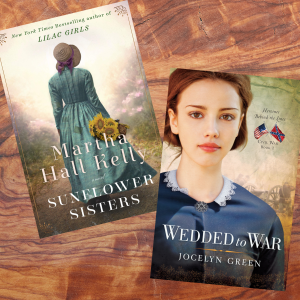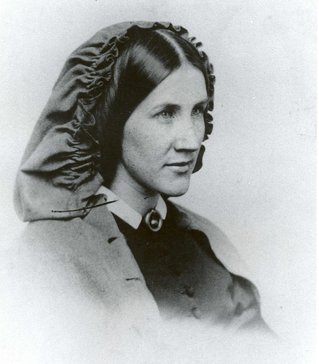
When I heard that Martha Hall Kelly, author of Lilac Girls and Lost Roses, was releasing a Civil War novel based on Georgeanna Woolsey, I was delighted! Georgeanna is the same historical figure who served as the inspiration for my protagonist, Charlotte Waverly, in my Civil War novel, Wedded to War (RiverNorth Fiction, 2012). Georgeanna was a remarkable woman and deserves more attention. I recently listened to Sunflower Sisters, and thought I'd share my thoughts as to how our two novels compare and contrast.
I saw in Kelly's novel many historical figures who populated my novel too, such as Frederick Olmsted, Robert Ware, Robert Knapp, Katherine Wormley, Elizabeth Blackwell, and more. Since I am very familiar with Georgeanna's life already, I don't know if that made me enjoy this more, or if I'd have been more captivated had it all been new to me. Certainly, the characters of the enslaved Jemma and the slave mistress Anne-May were completely new to me since they are fictional, and added a dimension I couldn't have predicted. I appreciate the multiple perspectives offered through this novel. Fans of Civil War fiction will not want to miss this.
A few major differences between Sunflower Sisters and Wedded to War:
1. Sunflower Sisters spans more time. Wedded to War focuses on the first 16 months of the war, which accounts for point #2. Major events that occur in Sunflower Sisters occur in

later books in my own Heroines Behind the Lines series. For instance:
- The battle of Gettsyburg and its aftermath is the entire theme of my novel, Widow of Gettysburg.
- The New York City draft riots of 1863, and the Sanitary Fair in New York City, both occur in my novel, Yankee in Atlanta. (In Yankee in Atlanta, more than half the story takes place in Atlanta, while the subplot takes place in NYC.)
- The espionage aspect of Sunflower Sisters is not reflected at all in Wedded to War. But spying is the theme of my novel Spy of Richmond.
2. Wedded to War goes much deeper into the medical care of the Union army in its first chaotic year, and what female nurses had to endure.
3. In addition to the protagonist nurse Charlotte, Wedded to War explores the plight of a desperate Irish immigrant, Ruby. In Sunflower Sisters, the foil to the protagonist nurse, Georgeanna, is the enslaved young woman, Jemma. While Wedded to War does not include an enslaved main character, slavery is explored in much more depth in both Widow of Gettysburg and Spy of Richmond.
4. The cast of characters is larger in Sunflower Sisters. Since Kelly portrays Georgeanna Woolsey, she also portrays her seven or eight siblings. One of the reasons I fictionalized Georgeanna in my Wedded to War was that I wanted a more focused cast of characters. My protagonist Charlotte only gets one sister, who is inspired by Georgeanna's sister Eliza.
5. Sunflower Sisters is general market fiction, and Wedded to War is Christian fiction, so you'll find a stronger emphasis on spiritual themes in the latter.
If you enjoy either Sunflower Sisters or Wedded to War, I think you'll enjoy the other!

For a list and descriptions of all my novels, visit this page.


Add new comment